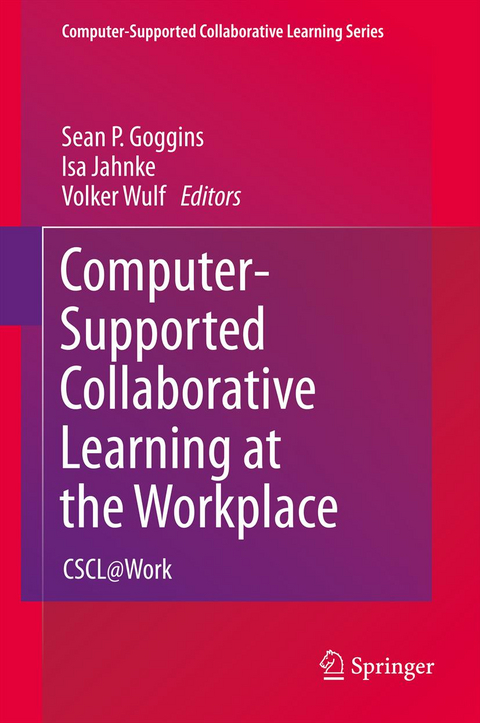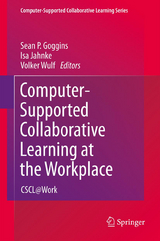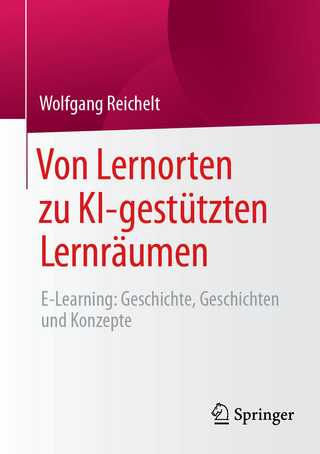Computer-Supported Collaborative Learning at the Workplace
Springer-Verlag New York Inc.
978-1-4614-1739-2 (ISBN)
Another significant thread of prior work is focused on computer supported collaborative learning, much of it investigating the application of computer support for learning in the context of traditional educational institutions, like public schools, private schools, colleges and tutoring organizations. Exciting new theories of how knowledge is constructed by groups (Stahl, 2006), how teachers contribute to collaborative learning (reference to another book in the series) and the application of socio-technical scripts for learning is explicated in book length works on CSCL. Book length empirical work on CSCW is widespread, and CSCL book length works are beginning to emerge with greater frequency.
We distinguish CSCL at Work from prior books written under the aegis of training and development, or human resources more broadly. The book aims to fill a void between existing works in CSCW and CSCL, and will open with a chapter characterizing the emerging application of collaborative learning theories and practices to workplace learning. CSCL and CSCW research each make distinct and important contributions to the construction of collaborative workplace learning.
Dr. Sean Goggins is an Assistant Professor at the College of Information Science and Technology at Drexel University, Philadelphia, PA . His research considers how the uptake and use of information and communication technology creates new opportunities for small groups to come together and perform work, be social and dissipate physical boundaries that have historically restricted the growth of nascent organizations. In particular, Sean focuses his research on the integration of methods from phenomenological research traditions, social psychology, sociology, human information behavior and design studies to explore socio-technical phenomena within organizations and outside of canonical organizational boundaries. Dr. Isa Jahnke is an Assistant Professor at the Centre for Research on Higher Education and Faculty Development of the Dortmund University of Technology, Germany. Her academic background is in sociology, educational sciences and computer science. Isa Jahnke’s research considers on new forms of computer-mediated human structures by using new media. In particular, she focuses on the study of socio-technical informal learning by developing theories, concepts and methods. Professor Volker Wulf is on the faculty of information Systems and the director of the Media Research Institute at the University of Siegen . At Fraunhofer FIT , he heads the research group, User-centred Software-Engineering (USE ). He is also a founding member of the International Institute for Socio-Informatics (IISI ), Bonn. In 2006/07 Wulf spent a sabbatical as a Fulbright Scholar at the University of Michigan, Ann Arbor, and at Stanford University, Palo Alto. His research interests lie primarily in the area of Computer Supported Cooperative Work, Knowledge Management, Computer Supported Cooperative Learning, Entertainment Computing, Human Computer Interaction, Participatory Design, and Organizational Computing.
Introduction to discourse on transforming K-12 learning by feeding ideas from CSCL at work.- Conceptual Framework for CSCL at work.- How to apply these case studies for radical workplace learning.- Case Study: Petex.- Case Study: Facebook Corporate Policy.- Case Study: Pivotal Decisions.- Case Study: Mammography.- Case Study: WoW and Informal Learning.- Case Study: Rural Technology Workers.- Case Study: Nurturing Learning Communities.- Case Study: ePortfolio System Administrator.- New Challenges for Researchers.
| Reihe/Serie | Computer-Supported Collaborative Learning Series ; 14 |
|---|---|
| Zusatzinfo | XII, 333 p. |
| Verlagsort | New York, NY |
| Sprache | englisch |
| Maße | 155 x 235 mm |
| Themenwelt | Schulbuch / Wörterbuch ► Unterrichtsvorbereitung ► Unterrichts-Handreichungen |
| Geisteswissenschaften ► Psychologie ► Allgemeine Psychologie | |
| Geisteswissenschaften ► Psychologie ► Pädagogische Psychologie | |
| Geisteswissenschaften ► Psychologie ► Verhaltenstherapie | |
| Sozialwissenschaften ► Pädagogik ► Erwachsenenbildung | |
| Sozialwissenschaften ► Pädagogik ► Schulpädagogik / Grundschule | |
| Schlagworte | accelerated technology transfer • ACM Meeting • collaborative workplace learning • Computer supported collaborative learning • Computer Supported Collaborative Work • CSCL • CSCW • CSCW (Computer Supported Cooperative Work) • group learning • socio-technical scripts for learning |
| ISBN-10 | 1-4614-1739-2 / 1461417392 |
| ISBN-13 | 978-1-4614-1739-2 / 9781461417392 |
| Zustand | Neuware |
| Haben Sie eine Frage zum Produkt? |
aus dem Bereich




